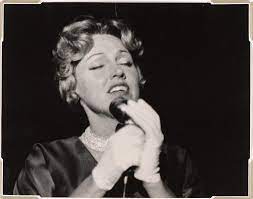The Jazz a la Mode Film Series resumes at Amherst Cinema tonight with an encore presentation of Anita O’Day: The Life of a Jazz Singer, a documentary that’s as gutsy and driven as its subject. O’Day was one of the greatest jazz singers of all time, highly esteemed by musicians as well as the public, with a style epitomized by the title of her 1959 album, Cool Heat. Many consider her the only white singer who’s on a par with Billie Holiday, Ella Fitzgerald and Sarah Vaughan.

Anita left an indelible impression on an earlier landmark of documentary cinema, Jazz on a Summer’s Day, as she sang a smoldering “Sweet Georgia Brown” and a swingin’ “Tea for Two” at the 1958 Newport Jazz Festival. Newport’s founder George Wein calls it “one of the greatest vocal performances ever heard.” That scene, and an extensive array of clips from O’Day’s stage and studio appearances, is interspersed with interviews of the singer and her colleagues in Ian McCrudden and Robbie Cavolina’s admiring documentary.
O’Day brought a vigorous, no-nonsense approach to jazz singing, and she’s equally blunt in her recollections of life on the road, negotiating the world of show biz, battles with drug and alcohol addiction, the hassle of living under constant surveillance by narcs, and the continual challenge of picking up the pieces after prison terms, scams, and rejections. She went from earning $2000 to $200 per week following a stretch at Terminal Island in 1953. Upon her release, she worked with Vido Musso’s combo at the Club Starlite in Los Angeles, and there began to feel the glare of patrons who’d shown up to see a female ex-con.
In her autobiography, High Times, Hard Times, O’Day writes, “Those five months in jail had turned my head around. I wasn’t the hip swinger who’d given [Gene] Krupa and [Stan] Kenton their first big hits. I still knew I had something to offer, but could I get it across to the people who lined up down the block to see the jailbird canary? I’d spent twenty years developing a style, but I didn’t know whether I could ever get an audience to listen to me.” It was ever thus: the first time an older jazz fan mentioned her to me, he talked all about her junky notoriety. I’m glad I heard the records too,

In the documentary, O’Day recalls an earlier controversy that ensued when she and trumpeter Roy Eldridge were featured together on Gene Krupa’s 1941 recording of “Let Me off Uptown,” the first instance in American popular music of a white woman and a black man engaging in a suggestive back-and-forth on record. She brings a survivor’s grit and grace to the telling of these and other episodes of her tumultuous career, all of which is recounted with a no-regrets sense of triumph.
Here’s Anita on television clips from the late ’50’s. The images are blurry and overexposed, but the performances come shining through. The first shows O’Day with Les Brown’s band singing “Four Brothers,” Jimmy Giuffre’s tribute to Woody Herman’s Second Herd; the latter features her with Lionel Hampton and Gene Krupa on “Let Me Off Uptown.”
